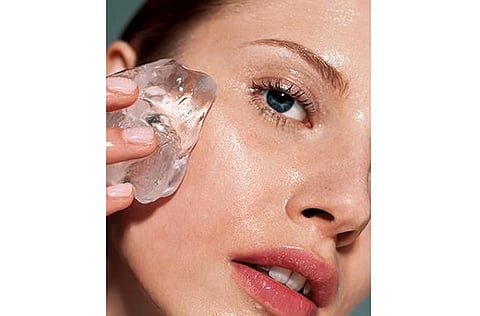Excessive perspiration? No sweat
What can you do if your sweating becomes excessive?

While damp underarms and dripping brows can be embarrassing and uncomfortable, for some people excessive perspiration can be a problem all year round, and the medical term for this is hyperhidrosis.
Normally, we can sweat up to one litre a day, but for excessive sweaters the body’s cooling mechanism goes into overdrive and can produce as much as four or five times what is needed to regulate temperature.
Armpits are the prime suspects, but the soles of the feet, face and palms are also areas with a high concentration of sweat glands, causing wet patches on clothes, clammy hands and smelly feet.
Hyperhidrosis affects around one in every 100 men and women and normally starts between the ages of 14-25 years. It can run in families, with a third of sufferers having a family member with the condition.
Dr Auldric Ratajczak, Nuffield Health’s deputy medical director for wellbeing, in the UK, says, ‘Primary hyperhidrosis is the name given to regular excess sweating for over six months that doesn’t have a clear underlying cause. “Normal” sweating can be caused by other conditions, like menopause, cancer, tuberculosis, bacterial infections, some medication, hormonal and neurological conditions, as well as a fever.’
Dr Sonia Gupte, general practitioner at iCare Clinic, Dubai adds, ‘With primary hyperhidrosis the sweating is restricted to specific parts of the body such as the palms, armpits or soles as opposed to sweating all over.’ The main problem with hyperhidrosis, she explains, is that because there is no serious underlying medical condition, that means there isn’t a definite cure or treatment plan. ‘Sufferers have hyperactive sweat glands and the way to go is addressing the hyperactivity of those sweat glands and helping patients manage symptoms such as body odour and clamminess.’
Confidence and quality of life
‘Everyday life can be severely impacted, with avoidance of wearing certain types of clothing, the need to apply antiperspirant several times a day, repeated body washing and also the worry about whether wetness or odour is obvious to others.’
She adds that sweating can affect people from the moment they wake up, particularly during the summer. ‘Clothing choices are a particular issue, sleeves are the order of the day for female sufferers, whereas many males will simply keep their suit jackets on all day to avoid revealing sweat patches on their shirts.’
Wearing cotton clothing is often a source of comfort to sufferers, says Dr Gupte. ‘Stay away from synthetics as much as possible and stick to natural fibres that let the body breathe and reduce sweating,’ she says.
On dates, special occasions or when giving presentations, perspiration can prove the most nerve-racking component of any activity. It can impact confidence in relationships too, and even lead to depression.
‘I have seen patients who have become increasingly anxious because of their symptoms, which only makes matters worse, often resulting in even more sweating. Some sufferers become so self-conscious that they experience a downward spiral and become clinically depressed.’
Seeking support
‘Seek help, don’t suffer in silence,’ advises Dr McKenna. ‘Stop focusing on banishing smells and focus on banishing sweat, with a high-strength antiperspirant containing aluminium chloride. Opt for something that is long-lasting and promises to protect you for hours, and ensure it’s not only effective in terms of stopping sweat, but that it is also kind to your skin.’
Dr Ratajczak adds: ‘Reduce stimulants such as caffeine and tobacco, and wear loose-fitting clothes in natural fibres. Losing weight reduces the amount of sweat too [if you are overweight to begin with].’
Food can trigger the condition too. ‘Spicy food can stimulate overactivity in sweat glands,’ Dr Gupte explains. ‘That combined with the high temperatures we experience in the UAE is a recipe for excessive sweating.’
Seeing your GP is advisable – especially if you are experiencing other symptoms as well. ‘If you feel unwell and have most of your sweating episodes at night, try to speak to your GP early on,’ says Dr Ratajczak. ‘For other cases, it is reasonable to start with lifestyle changes, and try a higher dose aluminium antiperspirant from the chemist if your skin tolerates it. If it fails, seek further advice from your GP.’
In some cases, Botox can be an effective temporary measure. ‘Botox has been used to treat the condition long before it became an aesthetic enhancer,’ says Dr Gupte. A single injection can control hyperhidrosis without blocking the glands and lasts for as long as three to six months.
‘Botox calms the nervous system, thus controlling the back-to-back signals it sends to our sweat glands to produce more sweat. This in turn reduces the overactivity of the glands – the root cause of hyperhidrosis.’




